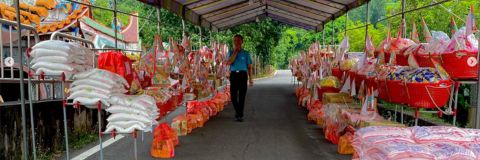
Ghost Festival in Taiwan: A Spectacular Display of Customs and Traditions
Taiwan, a land of vibrant culture and rich traditions, is no stranger to unique customs and celebrations. One such captivating event is the Ghost Festival, known as 中元節 (Zhongyuan Festival), which takes place during the seventh month of the lunar calendar. This month-long celebration culminates on the 15th day when the gates of hell are believed to be thrown open, allowing restless spirits to roam freely on the earthly plane. In this blog post, we'll explore the captivating customs and rituals that make the Ghost Festival a truly extraordinary event in Taiwan.
Understanding the Ghost Festival
The Ghost Festival, often referred to as Ghost Month, is deeply rooted in Taoist and Buddhist beliefs and happens every year on the seventh month of the lunar calendar. It is a time when the living pay respects to their deceased ancestors and make offerings to wandering spirits. The belief is that during this month, the souls of the departed are released from the underworld, and they seek sustenance and attention from their living relatives.
Temples Alive with Activity
During Ghost Month, Taoist temples across Taiwan come alive with activity. It's not unusual to find small temples, like the one we stumbled upon during a tea run, adorned with vibrant decorations and bustling with worshippers and curious onlookers.

One striking feature that catches the eye is the traveling puppet theatre often set up near temples. These puppet shows, known as "Budaixi," are an integral part of Ghost Month traditions. They depict ancient legends and tales from Chinese folklore, offering entertainment and spiritual nourishment to both the living and the spirits.
Elaborate Offerings and Rituals

One cannot talk about the Ghost Festival without mentioning the elaborate offerings and rituals that take place. In front of the temple we visited, we witnessed a ceremonial tent adorned with a stunning array of offerings.

These offerings include food, incense, and other symbolic items, all carefully arranged to appease the spirits and deities.

The food offerings are particularly significant, as they are meant to ensure that the hungry spirits find sustenance. It's common to see a variety of dishes, fruits, and even locally grown rice, like the 純正濁水米 (Chun Zheng Zhuo Shui Rice) we noticed. The belief is that by offering these items, the living can garner the blessings and protection of the gods while also placating the wandering spirits.
Honoring Ancestors and Wandering Souls
The 15th day of the seventh lunar month is the climax of the Ghost Festival. On this day, people across Taiwan pay their respects to their ancestors by setting up altars in front of their households. These altars are adorned with incense, candles, and offerings of food and drink. It's a time for families to come together, remember their ancestors, and seek their blessings and protection.
Apart from honoring ancestors, the 15th day is also dedicated to "good brothers and good sisters." These are the wandering ghosts who may not have living relatives to pray for them. Temples play a crucial role in providing a place for people to make offerings on behalf of these wandering spirits, ensuring that they too are remembered and cared for during Ghost Month.
The Spiritual Significance
While the Ghost Festival is a fascinating spectacle of rituals and customs, it holds deep spiritual significance for people in Taiwan. Beyond the colorful displays and captivating performances, it's a time for introspection and a reminder of the interconnectedness between the living and the departed.
The belief in the existence of spirits and the importance of maintaining harmony with them is a fundamental aspect of culture on the island. The Ghost Festival serves as a bridge between the realms of the living and the dead, allowing for communication and mutual respect.
Conclusion: A Window into Taiwanese Culture
In Taiwan, the Ghost Festival is more than just a series of rituals and traditions; it's a reflection of the deep-rooted spiritual beliefs and cultural heritage of the island. The elaborate offerings, temple ceremonies, and puppet shows all come together to create a unique and captivating experience during Ghost Month.
So, if you ever find yourself in Taiwan during the seventh month of the lunar calendar, be sure to immerse yourself in the customs and rituals of the Ghost Festival. It's a window into the rich tapestry of local culture, where the past and present, the living and the dead, coexist in a harmonious celebration of life and spirituality.
LET US KNOW!
Please post any questions or comments you may have in the comments section below!
SUBSCRIBE!
If you enjoyed this post and would like to hear more about the specialty tea industry here in Taiwan, follow us on YouTube, Facebook, and Instagram and please subscribe to our newsletter. Subscribe now and get US$5 off your first order.

